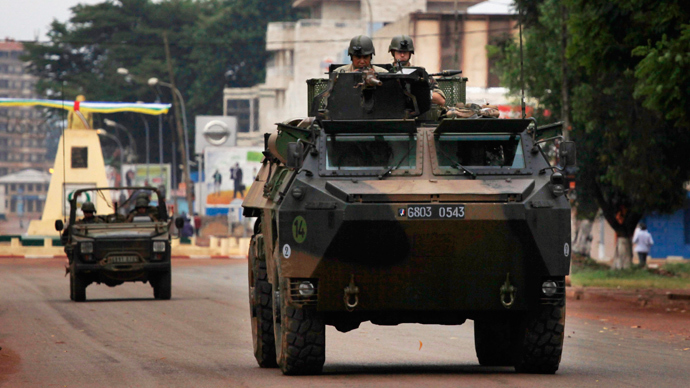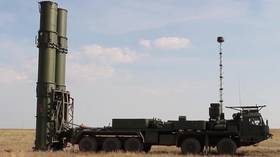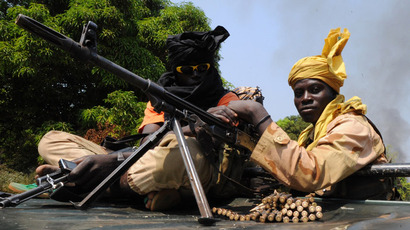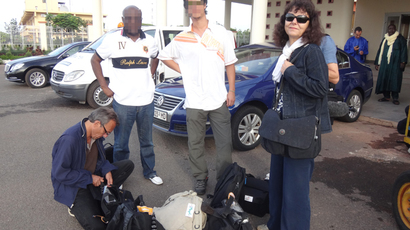French reinforcements land in Central African Republic

French reinforcements arrived in the restive Central African Republic to bolster France’s 600-strong force as military operations began overnight to quell violence in the capital and protect broader geostrategic interests in the country, analysts say.
French Defense Minister Jean-Yves Le Drian told Radio France
Internationale (RFI) that the streets of Bangui were calm on
Friday after French patrols and a helicopter hit the streets of
the capital early Friday, Reuters reports.
"The operation has effectively started," Le Drian told
RFI regarding the French Patrols.
Just hours before the United Nations Security Council voted to
send in French and African Union troops to stabilize the country
on Thursday, violence between Muslim former rebels now running
the country and a mixture of local Christian militiamen and
fighters loyal to ousted President Francois Bozize reportedly
left at least 105 dead.
The French-backed resolution authorizes the deployment of the
African Union-led force for a year with a mandate to use
“appropriate measures” to protect civilians and restore
security. The AU force, known as the African-led International
Support Mission in the Central African Republic (MISCA), is
expected to increase its troop strength from about 2,500 to
3,500.
The resolution also authorized French soldiers for a temporary
period “to take all necessary measures” to support MISCA
troops, primarily from Cameroon, Gabon and the Democratic
Republic of Congo.
Following the vote, French President Francois Hollande said the 600 French troops already in the Central African Republic on Thursday would be doubled “within a few days, even a few hours.”
Later on Friday, Hollande told some 40 African leaders gathered for a security summit in Paris that the continent must “ensure its own security” in order to “take charge of its destiny,” AFP reports.
He further promised that France would potentially help establish a special African rapid reaction force and would train up to 20,000 soldiers each year.
"France is ready to lend its full support to this force" by participating in training, Hollande said at the start of the summit.
Meanwhile, British Foreign Secretary William Hague said the UK had agreed to provide a C-17 transport aircraft to help in the French military campaign.
Hague said the aircraft will make three flights in December, with the first scheduled to touch ground in Central African Republic "shortly." The Foreign Office has decided putting British boots on the ground was “not on the table,” he continued.
Britain had previously provided two C-17 transport aircraft to carry foreign forces and equipment during the foreign intervention in Mali this past January.
The operation in the Central African Republic was launched with the aim of ending the sectarian strife which has ravaged the landlocked and mineral rich country of 4.6 million since an alliance of mainly Muslim militias known as Seleka launched a coup in March.
In September current President Michel Djotodia announced that Seleka had been dissolved.
The disbanded group has since dispersed into the countryside, where they have unleashed a campaign of gross human rights violations including rape, murder and looting in the Christian majority country, according to Human Rights Watch.
France’s UN Ambassador Gerard Araud told the Council after the
vote that “people have been terrorized by militia carrying
out atrocities.”
“On the security front, the country risks collapsing into chaos,
with uncontrollable and unforeseen consequences for the whole
region,” he warned. “On the human front, the risk of
mass atrocities is there.”
“History demands us to avoid the worst,” he said.
Abayomi Azikiwe, Editor of Pan-African News Wire, told RT that
France is not compelled by humanitarian interests, but rather
interested in “pursuing their own economic, political and
strategic interests.”
Azikiwe says the opposition requested the assistance of French
forces, as the alliance of militias known as the current
government commands marginal support in the country. He says that
since only 20 percent of the country is Muslim, the opposition is
“utilizing the fact politically that Seleka is a Muslim
dominated coalition” although they are “by no means
Islamic-oriented in terms of their political outlook.”
Writing for the Guardian, Simon Tisdall notes the religious component of France’s foreign policy, arguing that the current French interventionist doctrine “is about stemming the tide of Islamist extremism and sectarianism that threatens swaths of territory from the Horn of Africa to the Sahel and Maghreb – and potentially, the soft European underbelly of which France forms a vulnerable part.”
Tisdall says that “France’s happy interventionists” have a primarily “humanitarian focus,” although such expeditions have also “served to bolster fading French international prestige, especially in its former African colonies, and to boost [President Francois] Hollande's low approval ratings.”














